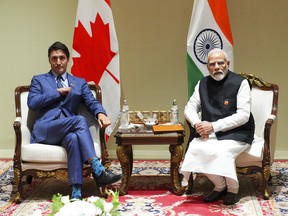The gaping holes in our immigration system constitutes a significant security concern

Article content
The Liberal and NDP coalition have failed to protect Canada’s borders. The military has been neglected: there are only 300 full-time military personnel in Canada’s vast North, and the government is looking to further reduce the defence budget. But the gaping holes in the immigration system constitutes another security concern, and underlies the recent diplomatic spat with India.
Advertisement 2
Story continues below
Article content
The controversy involves the Vancouver-area murder of Sikh leader Hardeep Singh Nijjar. Prime Minister Justin Trudeau accused “agents of the Government of India” of murdering Nijjar, a Canadian citizen. Indian authorities say this is “absurd,” and complain that they sought to have him, and others suspected of terrorism, extradited without success. Interpol issued two red notices for Nijjar, but Canada apparently disregarded them.
Article content
“He (Nijjar) had over a dozen criminal cases of murder and other terrorist activities against him in India. The details of the cases were shared with the Canadian authorities, but no action was taken except putting him on a no-fly list,” an Indian official told the Economic Times.
On Sept. 21, the Hindustan Times reported that, “Overall, there are 21 key gangsters based in Canada who are wanted by Indian agencies and their list and detailed evidence against them has been shared with the Royal Canadian Mounted Police (RCMP) on more than one occasion in the past year.
“Besides, a second officer said, Canadian police in the cities of Vancouver, Surrey and Ottawa have also often issued wanted notices against certain second generation Khalistani operatives there but the men in question roam freely.”
Article content
Advertisement 3
Story continues below
Article content
Canadians deserve responses from the federal government to these allegations about questionable immigration decisions and extradition snubs. A parliamentary inquiry is in order or, at the very least, an explanation from the ministers of immigration and justice.
Last week, similar allegations surfaced involving Bangladesh, which also attacked Canada’s extradition system for refusing to extradite Noor Chowdhury, who was convicted of assassinating former Bangladeshi president and founding father Sheikh Mujibur Rahman.
“Canada should not become a sanctuary for murderers. While killers find refuge in Canada and live comfortably, their victims’ families continue to suffer,” Bangladeshi Foreign Minister AK Abdul Momen told India Today.
Another issue involves the granting of student visas to foreign students. This year, a deportation order was issued for 700 student visa holders from India for using fraudulent university letters to obtain visas.
In June, the minister of immigration froze the planned deportation order. According to a Reuters report, “Students say they were unaware the documents were forged and have blamed the alleged fraud on the India-based immigration agents who helped them apply.”
Advertisement 4
Story continues below
Article content
Immigration Minister Sean Fraser said that, “Any pending removals will be halted in the interim and there will be a temporary permission to stay over the course of this period of consideration.… Those international students who are genuine applicants that came to Canada to study and were victimized by fraudsters will be given permission to remain in Canada,” but “those who are complicit in a fraudulent scheme will be held accountable.”
Fair enough, but why didn’t Ottawa properly vet the documents before the visas were issued? Is it common practice to rubber-stamp student visas without doing any due diligence? Some 800,000 were handed out last year alone.
Related Stories
-

Trudeau diplomatic blunder raises questions about who’s running show
-

Mitt Romney was a voice of reason in a country gone mad
-

Co-captains Trudeau and Singh running Canada into the ground
Another concern is that rescinding a deportation order is a rejection of immigration department judgment. Exactly what was the minister’s justification for doing this and how is the public being protected while his department is checking out whether these students were party to the fraud or not?
These situations are worrisome and raise questions about what type of due diligence is exercised when deciding who comes into Canada, as well as whether to acknowledge extradition requests from other countries. The public deserves answers and, until satisfied, immigration should be abated.
Financial Post
Bookmark our website and support our journalism: Don’t miss the business news you need to know — add financialpost.com to your bookmarks and sign up for our newsletters here.
Article content
This post was originally published on this site be sure to check out more of their content.












Comments
Postmedia is committed to maintaining a lively but civil forum for discussion and encourage all readers to share their views on our articles. Comments may take up to an hour for moderation before appearing on the site. We ask you to keep your comments relevant and respectful. We have enabled email notifications—you will now receive an email if you receive a reply to your comment, there is an update to a comment thread you follow or if a user you follow comments. Visit our Community Guidelines for more information and details on how to adjust your email settings.